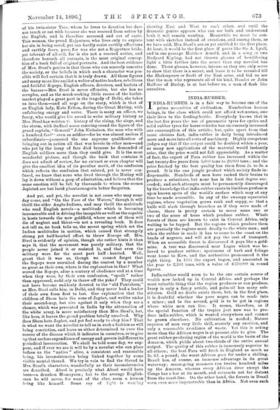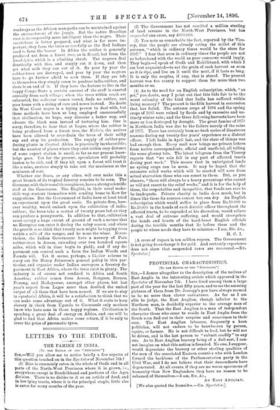INDIA-RUBBER.
INDIA-RUBBER is in a fair way to become one of the prime necessities of civilisation. Numberless human beings, in the class which could not afford wet-nurses, owe their lives to the feeding-bottle. Everybody knows that in the last five years the use of pneumatic tyres for cycles and solid rubber tyres for horse-vehicles has enormously increased our consumption of this article; but, quite apart from that more obvious fact, india-rubber is daily being introduced more and more into all sorts of machinery. Highly competent judges say that if the output could be doubled within a year, so many new applications of the material would instantly arise, that the price would not fall appreciably. As a matter of fact, the export of Para rubber has increased within the last twenty-five years from 5,600 tons to 20,000 tons ; and the price fetched by the best quality has risen from 2s. to 38. a pound. It is the one jungle product which society finds in- dispensable. Hundreds of men have racked their brains to produce a substitute, but none has in the least degree suc- ceeded; and such attempts must be permanently discouraged by the knowledge that india-rubber exists in limitless profusion upon known spots of the world's surface which may at any time be made accessible. In any of the swampy equatorial regions, where vegetation grows rank and sappy, so that a knife will slash through branches as if they were made of cheese, there is pretty certain to occur some one or two of the score of trees which produce rubber. Whole forests of them are known to exist in Central Africa, only waiting to be tapped. But the regions which produce them are precisely the regions most deadly to the white man ; and when the rubber is made it has to come to the coast on the heads of negroes, and will not pay the cost of transport. When an accessible forest is discovered it pays like a gold. mine. A tree was discovered near Lagos which was be- lieved to produce rubber; specimens of bark and foliage went home to Kew, and the authorities pronounced it the right thing. In 1895 the export began, and amounted in the year to 2,263 tons, with a value of £270,000 in round figures.
India-rubber would seem to be the one certain source of wealth now locked up in Central Africa. and perhaps the most valuable thing that the region produces or can produce. Ivory is only a fancy article, and palm-oil has many sub- stitutes. Gold no doubt exists there, but, in the first place, it is doubtful whether the pure negro can be made into a miner ; and in the second, gold is to be got in regions where white men can live. It seems, therefore, as if the special function of the tropics just now was to pro- duce india-rubber, which is wanted everywhere and cannot be grown elsewhere. No cultivation is needed ; Nature requires of man very little skill, scarcely any exertion, and only a reasonable avoidance of waste. Yet this is asking more than the African negro is at present able to give. The great rubber-producing region of the world is the basin of the Amazon, which yields about two-thirds of the entire annual output. The quality of this rubber is immensely superior to all others ; the beat Para will fetch in England as much as 3s. 63. a pound ; the worst African goes for under a shilling. Brazil has, of course, an immense advantage in its great waterway ; ocean-going steamers run twelve hundred miles up the Amazon, whereas every African river except the Congo has a bar at its mouth, and cataracts not far distant from the coast-line. On the other hand, the forests in Brazil seem even more impenetrable than in Africa. Nut even such
roadways as the African man-paths can be maintained against the encroachment of the jangle. But the native Brazilian race is incomparably more intelligent than the negro. Their caoutchouc is better prepared, and what is far more im- portant, they farm the trees as carefully as the Red Indians
used to farm the beaver In Africa the rubber is generally produced not from a forest tree, as in Brazil, but from the Lande/phia, which is a climbing shrub. The negroes deal drastically with this, and simply cut it down, and then get what milk they can out of it. So year by year the rubber-trees are destroyed, and year by year the negroes have to go farther afield to seek them. If they are left to themselves they simply cease to produce india-rubber, and there is an end of it. If they have the fortune to live in the happy Congo State a certain amount of the stuff is exacted annually from each village; when the trees within reach are exhausted, the collector comes round, finds no rubber, and goes home with a string of ears and noses instead. No doubt the West Coast negro is a trying person to deal with, but these methods have been so long employed unsuccessfully that civilisation, we hope, may discover a better way, and educate the black man instead of torturing him. One is sorry, therefore, to hear that at Lagos, where the rubber is being produced from a forest tree, the Ificksia, the natives have been allowed to over-drain the trees of their milky sap and atop its production. The supply of rubber-pro- ducing plants in Central Africa is practically inexhaustible; but the number of places where they exist within easy distance of some export station is small, so far as our present know- ledge goes. Yet for the present, speculators will probably hasten to be rich, and if they hit upon a forest will treat it like a mine, anxious simply to take out the maximum at the minimum of cost.
Whether our State, or any other, will ever make this a great branch of its tropical forestry remains to be seen. The Germans, with their usual thoroughness, have a strong scientific staff at the Cameroons. The English, in their usual make- shift way, content themselves with sending home to Kew for suggestions. But the Government of India have at least tried an experiment upon the great scale. No private firm, how- ever wealthy, would embark upon the cultivation of india- rubber ; the trees take a matter of twenty years before they can produce a pennyworth. In addition to that, cultivation must occupy a huge extent of ground of such a nature that no European can enter it during the rainy season, and where the growth is so thick that twenty men might be tapping trees within a mile of the ranger, and he none the wiser. Never- theless, the Indian Government have a nursery of Para rubber-trees in Assam, extending over two hundred square miles, which will in time begin to yield ; and if any de- partment can control such a farm the Indian Woods and Forests will. Yet it seems, perhaps, a likelier scheme to cirry out Sir Henry Johnston's general policy in this par- ticular, and organise under Indian surveyors a forestry de- partment in East Africa, where the trees exist in plenty. The industry is of course not confined to Africa and South America; rubber comes from Assam, Rangoon, Borneo, Penang, and Madagascar, amongst other places, but last year's export from Lagos more than doubled the united output of all those that have been named. If we are to stay in equatorial Africa, it will be a satisfaction to think that we can make some advantage out of it. What it costs to keep slavery in check from Uganda to Coomassie only mothers know who have sons in those happy regions. Civilisation is spending a great deal of energy on Africa, and one will be glad to find that Africa makes some return, if it be only to lower the price of pneumatic tyres.







































 Previous page
Previous page